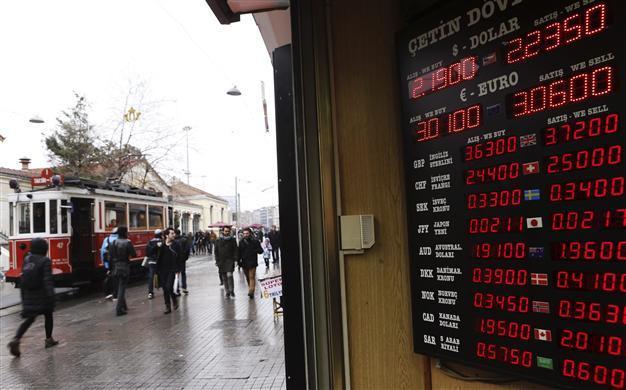Turkey’s credit rating downgrade not yet an issue: S&P
ISTANBUL

Foreign currency exchange rates are displayed on a screen outside an exchange office in central Istanbul Jan 29. REUTERS photo
A senior Standard & Poor’s analyst has said the agency’s recent cut of Turkey’s credit outlook does not necessarily mean the country’s credit rating grade will be trimmed, but simply indicates a higher probability that this will happen.“The rating downgrade is not an issue right at this moment,” Frank Gill, director of European Sovereign Ratings at Standard and Poor’s, said Feb. 10 during a live interview with Turkish broadcaster CNBC-e.
S&P revised the economic outlook of the country from stable to negative during the late hours of Feb. 7, saying it saw risks of a hard economic landing and the country’s policy environment was becoming less predictable.
The agency will review Turkey’s economic outlook in May, and Gill said the negative outlook indicated that a rating downgrade “may” come within the next 12 months.
S&P increased Turkey’s sovereign credit rating to BB-plus from BB in March 2013, becoming the only agency that did not upgrade Turkey to investment grade. S&P’s fellow ratings agencies, Fitch and Moody’s, have BBB- and Baa3 ratings for Turkey respectively, both with a stable outlook.
In a bid to explain the reasons behind the S&P’s decision, Gill mainly cited political and investment-related problems.
“We thought the current account deficit would be covered with longer term financing tools, but this didn’t happen. If we look at economic performance, we see the growth in the third quarter of 2013 was prompted by private consumption and public investments as well as spending, but the investments remained insufficient,” he said, stressing that the country’s ability to persuade foreign investors would be decisive for the upcoming period.
The country’s growth will be determined by “whether foreigners would be willing to finance domestic production with external sources or not,” according to the chief economist.
He said Turkey’s current account deficit was predicated to be greatly improved this year, but this will jeopardize the growth rate, which S&P’s sees dropping down to slightly higher than 2 percent in 2014.
















